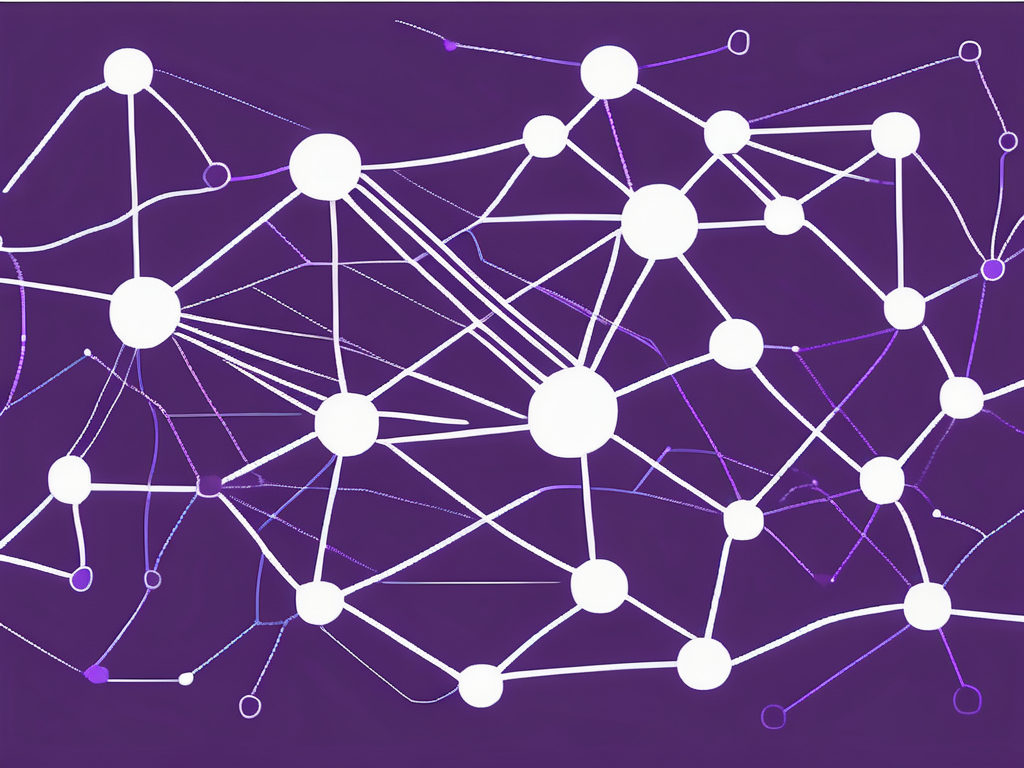
The Pitfalls of Point-to-Point Integration and How Vertify Can Help
Point-to-point integration has long been the go-to method for connecting disparate systems and exchanging data. However, as businesses grow and technology evolves, the limitations of this approach become increasingly apparent. In this article, we will delve into the pitfalls of point-to-point integration and explore how Vertify, a leading integration platform, can help businesses overcome these challenges and unlock their true potential.
Unveiling the Power of Vertify
At its core, Vertify is an integration platform designed to streamline data exchange between various systems, applications, and databases. What sets Vertify apart from traditional integration methods is its unique approach to data orchestration. Instead of relying on point-to-point connections, Vertify leverages a centralized hub that acts as the single source of truth for all data integrations.

This centralized approach offers numerous benefits. Firstly, it eliminates the need for multiple point-to-point connections, reducing complexity and maintenance efforts. Additionally, Vertify provides real-time visibility into data flows, ensuring that all integrations are monitored and managed effectively.
But what exactly makes Vertify’s integration platform stand out? Let’s dive deeper into its features and explore how it revolutionizes data integration.
Exploring the Features of Vertify’s Integration Platform
Vertify offers a comprehensive set of features that empower businesses to optimize their data integration processes. The platform’s intuitive user interface allows users to easily configure and manage integrations without the need for complex coding or IT assistance.
Furthermore, Vertify supports a wide range of data sources and destinations, enabling seamless integration between on-premises and cloud-based systems. Whether it’s CRM systems, marketing automation platforms, sales engagement, or data warehouses, Vertify can connect and synchronize data across the entire technology stack.
But that’s not all. Vertify goes beyond just connecting systems; it also ensures the quality and accuracy of the integrated data.
Another notable feature of Vertify is its ability to automate data validation and quality checks. By setting up custom data rules and filters, businesses can ensure that incoming and outgoing data adheres to their specific requirements. This ensures that the integrated data is reliable and consistent, enabling businesses to make informed decisions based on accurate information.
With Vertify, businesses can say goodbye to manual data validation processes and the risks associated with human error. The platform’s automated data quality checks save time and resources, allowing organizations to focus on extracting insights from their data rather than fixing data inconsistencies.
How Vertify Revolutionizes Data Integration
Traditional point-to-point integrations often suffer from scalability issues as businesses grow and add new systems to their infrastructure. Vertify solves this problem by offering a scalable and flexible integration solution.
With Vertify, businesses can easily add new systems and applications to their integration framework without disrupting existing connections. This scalability allows organizations to adapt to changing business needs and seize new opportunities without the fear of outgrowing their integration capabilities.
Moreover, Vertify’s flexible integration framework enables businesses to future-proof their data integration strategy. As technology evolves and new systems emerge, Vertify can seamlessly integrate with them, ensuring that businesses stay ahead of the curve and can leverage the latest tools and platforms.
Ongoing maintenance of connections can be a real drag for IT and Data teams when point to point integrations are prioritized over a solution like Vertify. This time it takes to keep a pulse on these custom builds and the time it takes to then physically maintain these can add up quickly. Compare this to a system like Vertify that automatically updates and maintains these connections month to month.
By embracing Vertify’s integration platform, businesses can unlock the full potential of their data, streamline their operations, and make data-driven decisions with confidence.
Extracting Insights: 3 Key Learnings
As businesses navigate the complexities of data integration, there are several key learnings that can be derived from Vertify’s integration solutions. These insights provide valuable guidance on how to optimize data flows and drive enhanced business outcomes.

Key Lessons from Vertify’s Integration Solutions
One of the key learnings from Vertify’s integration solutions is the importance of data governance. Establishing clear data governance policies and procedures ensures that data is standardized, accurate, and reliable. By implementing data governance practices, businesses can mitigate data quality issues and improve overall data integrity.
For example, Vertify’s integration solutions offer comprehensive data profiling capabilities that allow businesses to gain a deeper understanding of their data and data schema. This includes identifying data anomalies, inconsistencies, and duplicates, which can then be addressed through data cleansing processes. By proactively managing data quality through robust governance practices, businesses can make more informed decisions and drive better business outcomes.
Another valuable lesson from Vertify’s integration solutions is the significance of establishing strong data security measures. As data flows between different systems, it is crucial to safeguard sensitive information and prevent unauthorized access. Vertify offers robust security features that protect data at rest and in transit, providing businesses with peace of mind.
Moreover, Vertify’s integration solutions employ advanced encryption at rest algorithms to ensure the confidentiality and integrity of data. These encryption techniques, combined with secure authentication protocols, create a multi-layered security framework that safeguards data from potential threats. By prioritizing data security, businesses can build trust with their customers and partners, fostering strong relationships based on data privacy and protection.
Implementing Best Practices from Vertify’s Integration Strategies
Vertify’s integration strategies have also revealed the importance of process automation. By automating data integration tasks, businesses can reduce manual effort and improve operational efficiency. This allows employees to focus on higher-value activities, driving productivity and innovation throughout the organization.
For instance, Vertify’s integration solutions offer intelligent workflow automation capabilities, enabling businesses to streamline their data integration processes. This includes automating data mapping, transformation, and validation tasks, eliminating the need for manual intervention. By leveraging automation, businesses can accelerate data integration timelines, reduce errors, and achieve greater agility in responding to changing business needs.
Furthermore, Vertify emphasizes the value of near real-time data synchronization. With near real-time integration, businesses can access up-to-date and accurate data across all systems, empowering decision-makers with timely insights. Real-time data synchronization minimizes data latency and ensures that all stakeholders have access to the most recent information.
As an example, Vertify’s near real-time integration solutions offer seamless connectivity with various data sources, enabling businesses to capture and synchronize data within second or minutes. This includes integrating with popular cloud-based applications, on-premises systems, and even IoT devices. By harnessing the power of real-time data synchronization, businesses can make data-driven decisions with confidence, respond swiftly to market changes, and gain a competitive edge.
Decoding Point-to-Point Integration
Before delving deeper into the advanced capabilities of Vertify’s integration platform, let’s take a moment to understand the limitations of point-to-point integration.
Point-to-point integration involves building custom integration connectors between individual systems. While this approach may seem feasible for a small number of connections, it quickly becomes cumbersome and inefficient as the number of systems increases.
Each new connection requires custom development, extensive testing, and ongoing maintenance. APIs are constantly evolving and therefore maintenance and governance of these changes can become a labor-some ongoing task. As a result, the cost and complexity of managing multiple point-to-point integrations can skyrocket, making it a less viable option for organizations seeking scalability and efficiency.
The Next Level of iPaaS Technology
Now that we have a clear understanding of the challenges associated with point-to-point integration, let’s explore the next level of integration technology: iPaaS (Integration Platform as a Service).

iPaaS platforms, such as Vertify, provide a comprehensive suite of integration tools and services in a cloud-based environment. These platforms offer a scalable, unified approach to data integration, eliminating the need for custom point-to-point connections.
Understanding the Advanced Capabilities of iPaaS
iPaaS platforms, like Vertify, offer a range of advanced capabilities that revolutionize data integration. One such capability is the ability to create reusable integration templates. These templates streamline the integration process by providing pre-built connectors and mappings for common systems and applications.
In addition, iPaaS platforms leverage APIs (Application Programming Interfaces) to facilitate seamless data exchange between systems. These APIs ensure that data is transmitted securely and efficiently, enabling organizations to leverage the full potential of their integrated technology ecosystem.
iPaaS Unleashed: Your Path to Scalability
Scalability is a critical consideration for businesses of all sizes. As organizations grow, they need to adapt their integration strategies to accommodate new systems, applications, and data sources.
Scaling Your Business with iPaaS Integration
iPaaS platforms, like Vertify, offer unmatched scalability. With built-in connectors and templates, businesses can easily add and configure new systems within the integration framework. This enables organizations to scale their integration capabilities without incurring the exorbitant costs and complexities associated with point-to-point approaches.
Furthermore, iPaaS platforms offer robust scalability features, such as horizontal and vertical scaling, to handle increasing data volumes and processing requirements. This ensures that businesses can maintain seamless data flow and support their growth trajectory.
The Benefits of Scalable Integration Solutions
Scalable integration solutions, like Vertify’s iPaaS platform, bring numerous benefits to businesses. Firstly, scalability enables organizations to future-proof their integration infrastructure, allowing for seamless integration of new technologies and systems as they emerge.
Additionally, scalable integration solutions enhance operational efficiency and agility. By automating data integration tasks and eliminating manual efforts, businesses can streamline their processes and respond promptly to market changes and customer demands.
Elevate Your Integration Game with Advanced iPaaS Solutions
As businesses grow and evolve, they require integration solutions that can keep up with their changing needs. Advanced iPaaS solutions, such as Vertify, are designed to address these challenges and unlock the full potential of data integration.
Vertify’s advanced iPaaS platform offers an extensive array of features and capabilities that empower businesses to streamline their data integration processes. From real-time data synchronization to scalable integration frameworks, Vertify provides the tools and functionality to drive enhanced business outcomes.
iPaaS Unleashed: The Solution for Your Growing Business
For businesses embarking on a growth journey, iPaaS integration is a game-changer. With its scalable and flexible architecture, Vertify’s iPaaS platform is the ideal solution for businesses of all sizes.
Leveraging iPaaS for Seamless Scalability
iPaaS integration offers businesses the agility and scalability they need to thrive in a rapidly changing business landscape. By leveraging Vertify’s iPaaS platform, organizations can seamlessly integrate new systems, automate data flows, and future-proof their integration capabilities.
In conclusion, point-to-point integration comes with inherent pitfalls that hinder scalability and efficiency. However, with Vertify’s powerful integration platform, businesses can overcome these challenges and revolutionize their data integration processes. From its centralized hub to advanced iPaaS capabilities, Vertify offers a comprehensive solution that empowers businesses to unlock the full potential of their data integration efforts. Embrace the power of Vertify and take your integration game to new heights!
Ready to transform your data integration strategy and achieve a unified view of your customer journey? With Vertify, orchestrating and activating all your revenue apps is effortlessly within reach. Say goodbye to the complexities of coding and technical setups. Our intuitive platform empowers you to automate the flow of customer data across any revenue system, in real-time, with simple drag-and-drop actions. Learn more about Vertify and start harnessing the full power of your data today.